The term synthetic data refers to artificially generated data that imitates actual or real data. As the definition suggests, synthetic data is often used in artificial intelligence applications.
Why is synthetic data important? Approximately 328.77 million terabytes of data are created each day. There are limits to what and how you can use this vast amount of data without breaking compliance laws or compromising privacy.
By using synthetic data, organizations can overcome the challenges of data access, data sharing, and data privacy and can still perform critical tasks that depend on real-world data. Moreover, synthetic data helps organizations overcome data scarcity issues, especially when there is a limited amount of actual data available for analysis or AI model training.
Read on to learn more about the best synthetic data software, including their pricing, features, pros and cons, integration and more.
Jump to:
- Top synthetic data software: Comparison chart
- Best synthetic data software
- Key features of synthetic data software
- How to choose the best synthetic data software for your business
- How we evaluated the best synthetic data software
- Bottom line: Top synthetic data software
Top Synthetic Data Software: Comparison Chart
| Best for | Data Customization | Data masking | Starting price | |
|---|---|---|---|---|
| MOSTLY AI Synthetic Data Platform | Ease of use | Limited | Yes | $3 per credit |
| Syntho | Small and medium businesses | Extensive | Yes | Custom quotes |
| GenRocket | Test data management (testers) | Extensive | Yes | $55,000 per year |
| Tonic.ai | Developers | Limited | Yes | Custom quotes |
| Hazy | Financial services | Limited | Yes | Custom quotes |
| K2View | ML training | Extensive | Yes | Custom quotes |
| Datomize | Data analyst and machine learning engineer | Extensive | Yes | $720 per month, billed annually or $800 per month, billed monthly |
| Sogeti | Testing and development use cases | Extensive | Yes | Custom quotes |
| CA Test Data Manager | Complex data generation | Extensive | Yes | Custom quotes |
Top 9 Synthetic Data Software
MOSTLY AI Synthetic Data Platform: Best for ease of use
Overall rating: 4.55
- Cost: 5
- Feature Set: 5
- Ease of Use: 5
- Tools: 5
- Support: 2
We included MOSTLY AI for its versatility and comprehensive features. This versatility allowed us to generate realistic and diverse datasets for a variety of use cases.
The MOSTLY AI synthetic data platform allows enterprises across industries to generate high-quality, privacy-preserving synthetic data. Those in the banking, telecommunication, healthcare and insurance can use MOSTLY AI to generate synthetic data for various use cases such as data anonymization, artificial intelligence and machine learning development, testing and product development, and cross-border and enterprise data sharing.
To learn about the tool, I created a free account, which took me less than two minutes to sign up. After signing up, I didn’t have data to upload so I selected one of the three sample data available (Bank Marketing) and proceeded to generate synthetic data based on that sample.
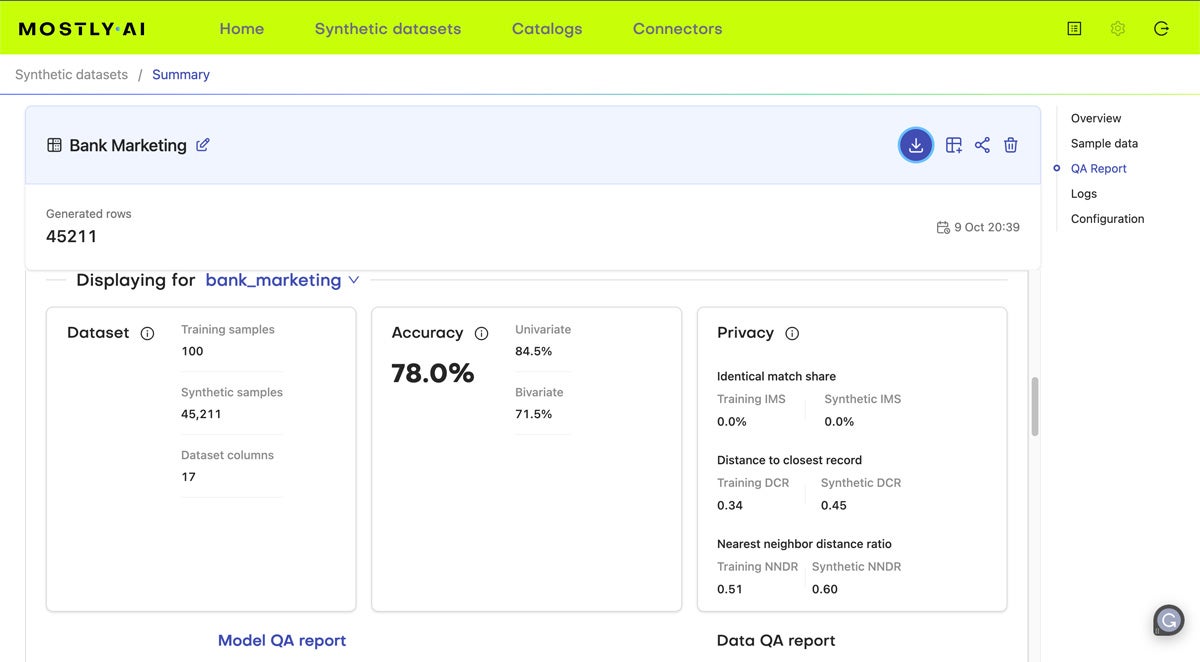
Pricing
- Free forever plan: Allows you to generate up to 100K rows per day.
- Team: $3 per credit.
- Enterprise: $5 per credit.
The actual price you will pay per month depends on the number of data subjects (rows), data points per subject (columns) and creators (users). For instance, a “team plan” user with 1 creator, 100 data points per subject, and 100,000 data subjects will pay $1,860 per month or $22,320 per year, while an “enterprise plan” user with the 1same feature will pay $3,100 per month or $37,200 per year.
Key features
- Time-series support.
- Support for different data types – MOSTLY AI works with various structured data: numerical, categorical, and date-time variables.
- Data rebalancing for data exploration.
- Deployment via Kubernetes or OpenShift.
Pros
- Users say the free plan is feature-rich.
- The platform is easy to learn and use.
Cons
- Dedicated support is limited to enterprise plan users.
- Users says the UI elements can be improved.
MOSTLY AI integrations
You can connect MOSTLY AI with various third-party tools, including:
- Amazon Web Services (AWS)
- Microsoft Azure
- Google Cloud Platform
- Oracle Cloud Infrastructure
- PostgreSQL
- SQL Server
- Snowflake
- Databricks
- Maria DB
Also see: Best Artificial Intelligence Software
Syntho: Best for small and medium businesses
Overall rating: 3.28
- Cost: 0
- Feature Set: 5
- Ease of Use: 4.5
- Tools: 5
- Support: 1
Our research found that Syntho’s synthetic data can be used for data analysis as though it is real data, and the outcomes will be nearly identical to analysis results on the original data.
Syntho is an Amsterdam based startup founded in 2020 that AI-Generated Synthetic data for public organizations, healthcare and finance industries. This synthetic data can be used by organizations for training machine learning models, testing applications, and conducting data analysis without compromising privacy or security.
You can deploy Syntho on-premise, any (private) cloud and Syntho cloud. You can also run the Syntho Engine as a Docker container or python package in your secure IT environment. To do this there are some minimum hardware and software requirements that you must meet.
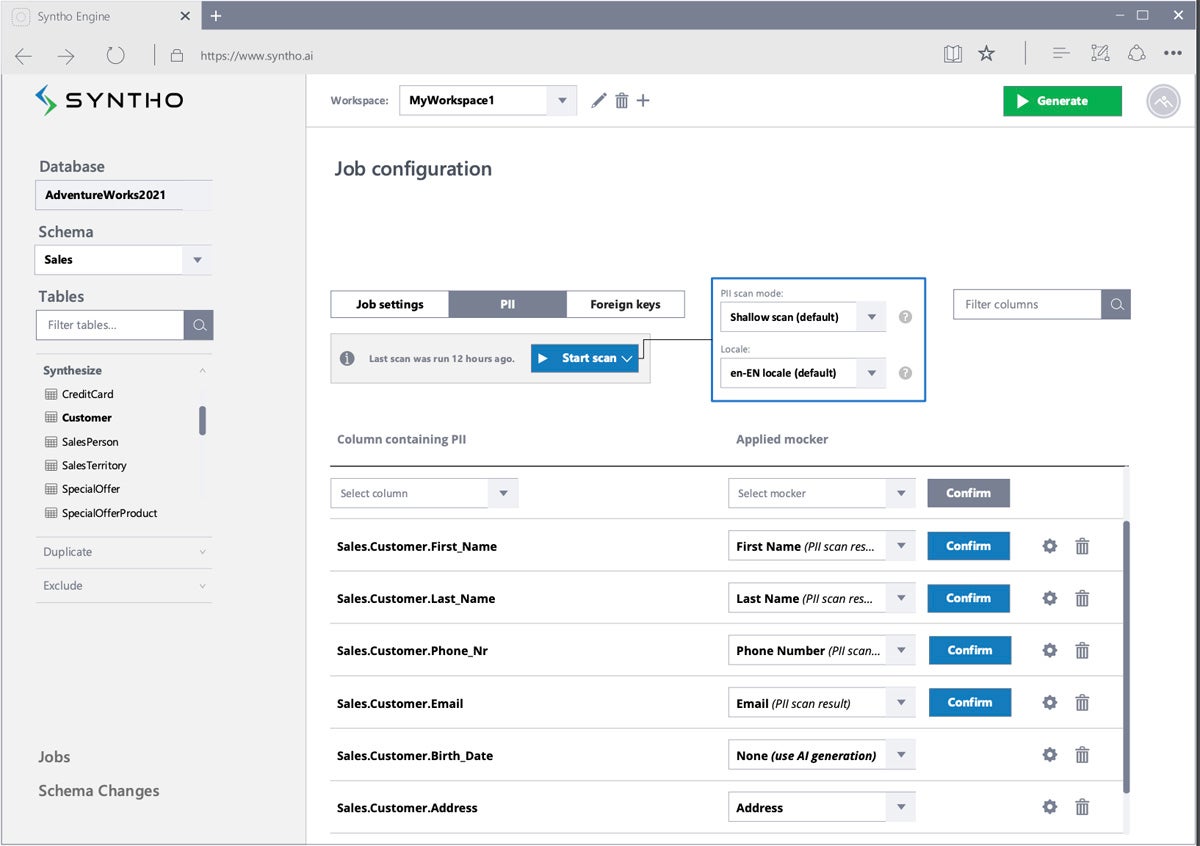
Minimum hardware requirements
- 32 GB of RAM
- 8 virtual CPUs
- ‘Sufficient’ storage for the data
Minimum software requirements
- Docker Compose Deployment
- Docker: 1.13.0+
- Docker-compose: V3 and higher
- Kubernetes Deployment (alternative)
- Kubernetes: 1.20 and higher
- helm: v3 and higher
Pricing
Syntho offers three pricing plans: Basic, standard and ultimate. However, the vendor requires interested buyers to contact them for quotes. Pricing depends on the size of your database and your preferred plan.
Key features
- Support time series data and longitudinal data.
- On-premise and private cloud integration.
- PII discovery and generation.
- Auto-scaling via Ray & Kubernetes.
Pros
- Advanced subsetting capability.
- Its self-service capability and easy-to-use interface make it accessible to users of all skill levels.
- Role-based access control (RBAC).
Cons
- Lacks free plan and pricing transparency.
- Some users reported that it does not infer the relationship between databases.
Syntho integrations
Syntho integrates with various databases and filesystems.
- Postgre SQL
- MySQL
- Microsoft SQL Server
- Oracle
- Databricks
- Amazon S3
- Sybase
- MariaDB
- Hive
- IBM DB2
GenRocket: Best for test data management (testers)
Overall rating: 2.43
- Cost: 0.65
- Feature Set: 3.75
- Ease of Use: 1.5
- Tools: 2
- Support: 2
We selected GenRocket because it allows developers and testers to generate data sets with specific characteristics, formats, and structures required for testing different scenarios. This accelerates the testing process and improves the overall quality of software applications.
GenRocket is a software company that specializes in test data generation. It provides a platform that allows users to create and manage realistic and customizable test data for software testing and development purposes. The generated data can be used for various types of testing, including functional, performance, and security testing. GenRocket also offers additional features, such as data masking and subsetting, to ensure data privacy and compliance.
GenRocket has a four-step methodology that enables testers to work independently to provision their own data on demand.
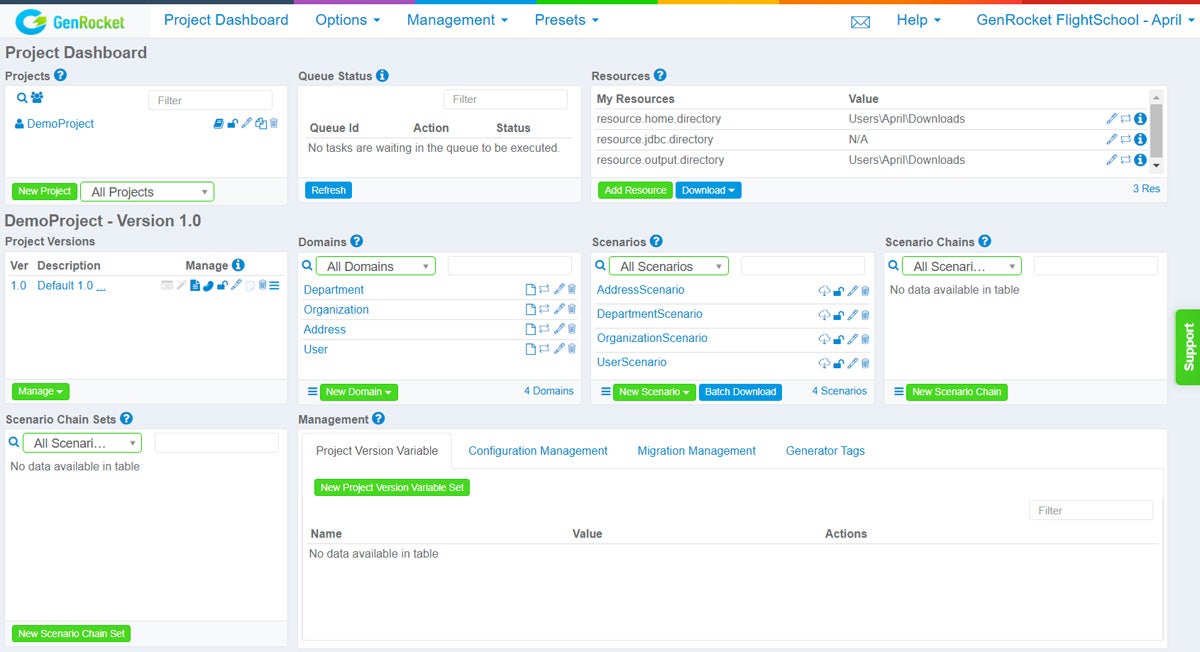
- Model – the data to be generated during testing.
- Design – the variety and volume of data for testing.
- Deploy – test data cases into a test environment.
- Manage – test data projects in a shared repository.
Pricing
GenRocket offer three pricing plans.
- Growth: $55,000 per year. Includes 20 test data projects.
- Business: Quotes available on request. Includes 40 test data projects.
- Advanced: Quotes available on request. Includes 80 test data projects.
Key features
- Offers a library of 730+ data generators.
- Has a library of 101+ data formats.
- Data subsetting and masking.
- Support various test use cases, including realistic data, negative data, data for complex workflows, machine learning data and X12 EDI transaction data.
Pros
- Self-service test data portal.
- Can be integrated into your CI/CD release pipeline.
- User applauds GenRocket technical support.
Cons
- Add-on cost extra fee.
- Steep learning curve.
GenRocket integrations
Some of the top tools GenRocket integrates with include:
- Jenkins
- Azure DevOps
- Selenium
- UiPath
- Katalon
- Tosca
Also see: 100+ Top AI Companies
Tonic.ai: Best for developers
Overall rating: 3.93
- Cost: 1
- Feature Set: 5
- Ease of Use: 4.5
- Tools: 5
- Support: 4
We selected Tonic.ai for its advanced capabilities in generating privacy-conscious synthetic data. Although it requires you to invest time to learn and implement the platform, we found Tonic.ai’s ability to preserve relationships, consistency and complex structures in the data is particularly valuable.
Tonic.ai’s synthetic data platform equips developers with the tools they need to generate “fake data” that closely resemble real data. The platform allows developers to create realistic test data based on your organization’s data, preserving critical relationships and maintaining input-to-output consistency across tables and databases. Tonic.ai is suited for developers and data scientists in finance, ed-tech, insurance, retail and healthcare.
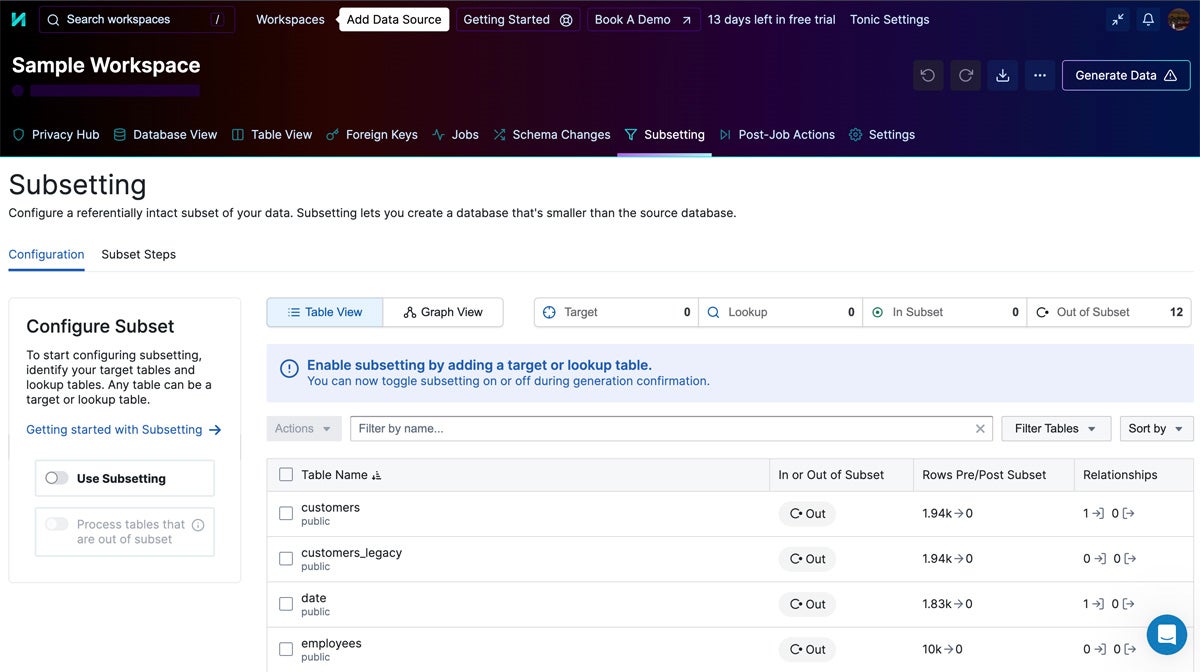
Pricing
Tonic is available in two editions: Tonic cloud and enterprise. To get quotes for these plans, you must contact an in-house expert for custom quote. Tonic offers a 2-week free trial which allows you to try the tool before making a purchase decision.
Key features
- It supports several flat files including .txt, JSON, CSV and XML.
- Schema change alerts capability helps to prevent sensitive data leakage.
- Connects with several CI/CD applications.
- De-identification and AI synthesis capabilities.
Pros
- Ranks high for ease of use and feature set.
- Offers quality customer support.
- Offers subsetting functionality.
Cons
- Some users reported that the tool is somewhat expensive.
- Steep learning curve.
Tonic.ai integrations
This platform integrates with several third-party services including
- PostgreSQL
- MySQL/MariaDB
- SQL Server
- MongoDB
- Vertica
- DocumentDB
- Oracle
- Snowflake
- Redshift
- BigQuery
- Databricks
- Amazon EMR w/ Glue
- Spark
Hazy: Best for financial services
Overall rating: 3.18
- Cost: 0
- Feature Set: 5
- Ease of Use: 4.5
- Tools: 2.5
- Support: 2
Hazy enables businesses to create realistic but entirely fictional datasets that mimic the statistical properties of accurate data without exposing actual customer information. Hazy is used in the financial services industry for fraud modeling, asset management and customer engagement, financial crime, credit risk, AML, and operational risk.
Hazy’s synthetic data engine is built to handle complex data from large enterprise. Hazy can connect with complex network and security setups, working alongside your original data to provide the highest level of protection, whether it’s stored on your premises or in your private cloud. With Hazy, complex data can be generated for financial service applications and securely stored within the company’s silos.
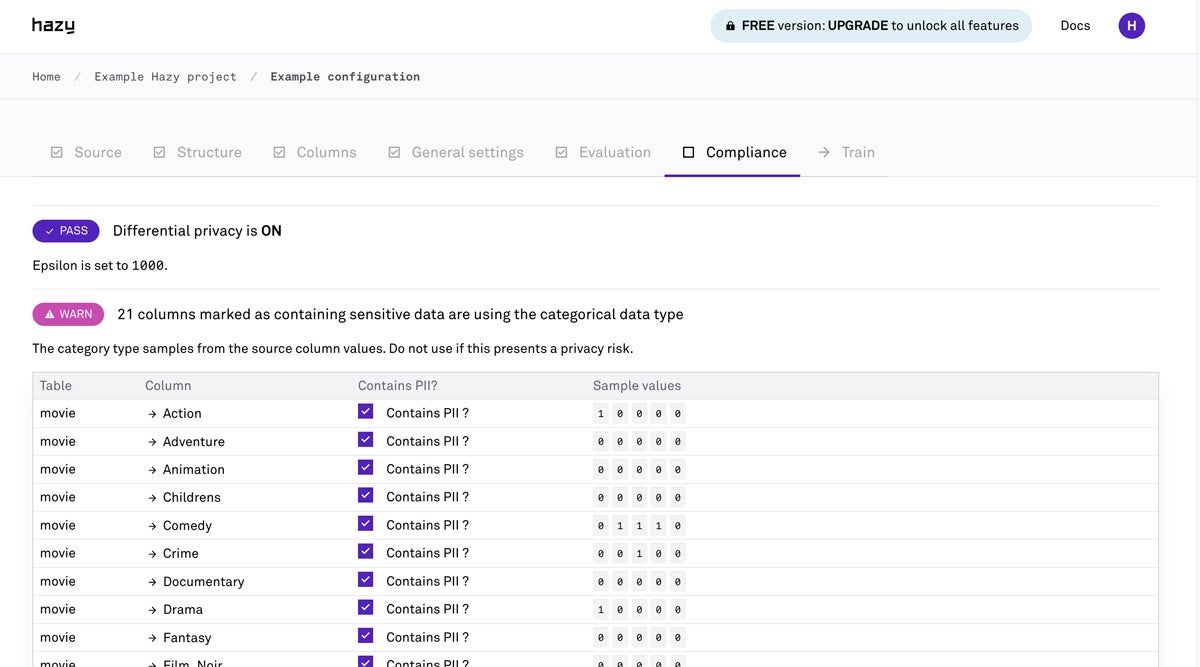
Pricing
The company doesn’t advertise its rate on its website but encourages interested buyers to get in touch with an in-house expert by completing a short form on their website.
Key features
- Advanced memory optimization and subsetting techniques lower energy usage.
- Deploy on-premises or in the cloud.
- It can create diverse datasets that encompass various scenarios, enabling thorough testing and analysis.
Pros
- Support complex data needs.
- Users applaud Hazy’s built-in privacy tools.
Cons
- May not be suitable for small companies.
- Lacks transparent pricing.
Hazy integrations
Top Hazy integrations:
- Snowflake
- AWS
- Azure
On a related topic: What is Generative AI?
K2View: Best for ML training
Overall rating: 3.60
- Cost: 3.25
- Feature Set: 5
- Ease of Use: 2
- Tools: 5
- Support: 1
K2View offers four synthetic data generation methods, making it easy for teams to generate and integrate synthetic data into CI/CD (Continuous Integration/Continuous Deployment) and ML (Machine Learning) pipelines.
K2View synthetic data generation tool combines four data generation methods: Generative AI, rules engine, entity cloning, and data masking.
- Generative AI: The Generative AI model involves subsetting the required source data to train generative AI models. This data is then masked to ensure privacy and protection. The masked training data is used to train the GPT (Generative Pre-trained Transformer) model, which enables synthetic data generation.
- Rule engine: Rule-based data generation allows you to generate data creation functions based on data classification, and then you can proceed to customize, test, and debug the functions code-free. The rules engine data generation allows users to assign business parameters for the functions and generate data on demand or via API.
- Entity cloning and data masking: Entity cloning allows you to extract, mask, and clone a single business entity and all its data and then create unique identifiers for each cloned entity. The data masking data generation method auto-discovers sensitive and personally identifiable information (PII) and then applies prebuilt, customizable data masking functions. K2View allows you to mask data inflight, as it’s extracted from the sources.
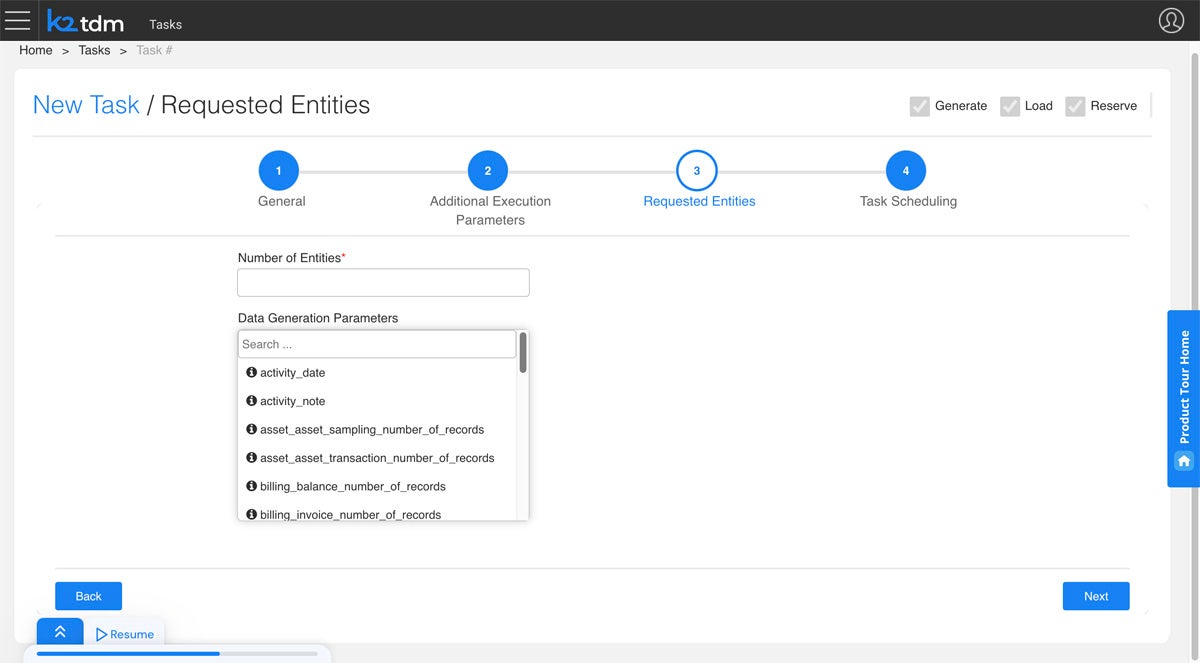
Pricing
K2View pricing is available on demand.
Key features
- Connectors to structured and unstructured data sources.
- Low code/no-code platform.
- Version and roll back datasets on demand.
Pros
- Preserves data relationships.
- Data masking capabilities.
- Enhance data privacy and compliance.
Cons
- Steep learning curve for beginners.
- Users say it’s expensive.
K2View integration
You can connect K2View with the following tools:
- IBM DB2
- Salesforce
- Oracle
- Couchbase
Datomize: Best for data analysts and machine learning engineers
Overall rating: 3.96
- Cost: 4.4
- Feature Set: 3.4
- Ease of Use: 4.5
- Tools: 5
- Support: 3
Our research found that Datomize excels in analytical data sets with its AI-powered data generation capabilities. By leveraging behavior extracted from current data, Datomize allows data analysts and machine learning experts to generate precise and relevant analytical data sets.
The Datomize AI-powered data generation platform allows data analysts and machine learning experts to get the most out of their analytical data sets. It enables you to generate the exact analytical data sets required using the behavior extracted from current data, and creates synthetic data that is similar in properties to the original data but without containing any sensitive or personal information.
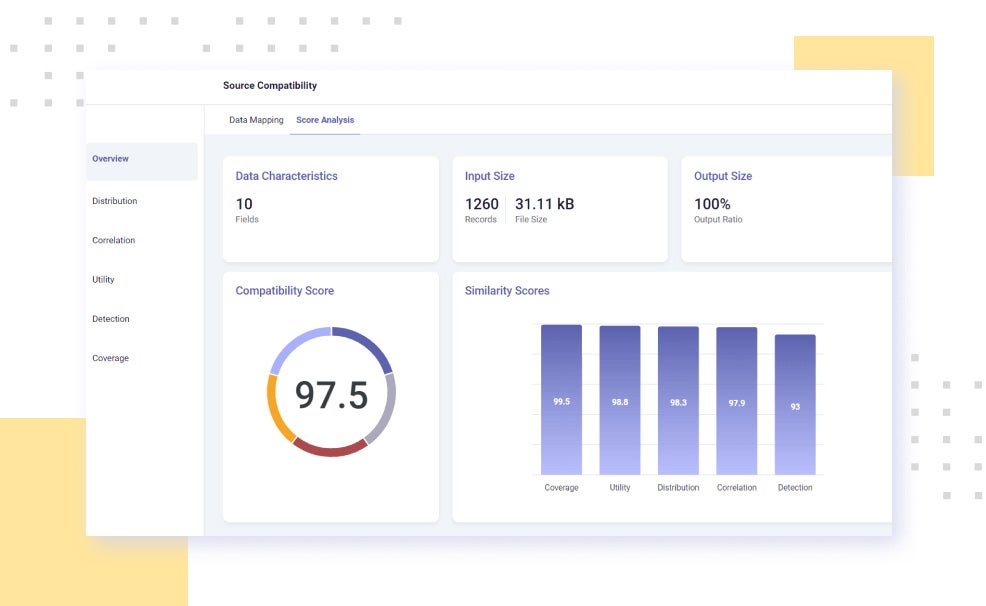
Pricing
- Community: Free forever plan with 40 credits per month and up to 20MB input size.
- Starter: $720 per month, billed annually or $800 per month billed monthly. It includes 160 credits per month plus up to 500MB input size.
- Enterprise: Quote available upon request. Unlimited usage and input size.
Key features
- Advanced augmentation capabilities.
- Datomize’s rules-based engine enables users to generate the exact analytical data set needed for any desired scenario.
- Support time-series data.
Pros
- Offers a free forever plan.
- Predict outcomes for any scenario.
Cons
- Limited resources about the product.
- Lacks live chat support.
Datomize integrations
- Python SDKs
- PostgreSQL
- MySQL
- Oracle
Sogeti Artificial Data Amplifier (ADA): Best for testing and development use cases
Overall rating: 2.55
- Cost: 0
- Feature Set: 5
- Ease of Use: 1
- Tools: 5
- Support: 2
Sogeti received high marks for its feature set, which includes the maturity of the product, its ability to serve large enterprises and output fine tune capability. Sogeti also scored 5 out of 5 for “Tools” due to its quality of generated data and scalability.
Part of the Capgemini Group, Sogeti is a Managed Service Provider (MSP) with operational presence in over 100 locations globally. Sogeti ADA generates realistic, usable data based on real data sets. it leverages advanced deep learning based on a combination of artificial neural networks to analyze existing data and create similar but new data points. It can generate large volumes of data, helping organizations tackle the data scarcity challenge.
Pricing
Quotes are available upon request.
Key features
- Realistic and diverse data generation.
- Support for different data types.
- Bias and overfitting reduction.
Pros
- Sogeti’s generated data preserves all the characteristics, correlations and properties of the original data.
- It can be customized to suit your specific needs and use cases.
Cons
- Lacks transparent pricing.
- Usability requires training and expertise.
Sogeti Integrations
Sogeti top integrations include:
- SAP S/4HANA
- Azure
- AWS
Also see: Generative AI Companies: Top 12 Leaders
CA Test Data Manager: Best for complex data generation
Overall rating: 2.78
- Cost: 0
- Feature Set: 3.25
- Ease of Use: 4
- Tools: 5
- Support: 2
Significantly CA Test Data Manager focuses on protecting sensitive information – it offers features such as data masking, which helps to protect sensitive and personal information in test environments by replacing real data with realistic but fake data.
Developed by CA Technologies, CA Test Data Manager is a tool allows you to create, generate, mask, and refresh test data for application testing. CA Test Data Manager automates the process of creating test data by integrating with various data sources and providing data management features like data subsetting, data masking, and synthetic data generation. CA Test Data Manager supports 32-bit and 64-bit physical and virtual Windows machines.
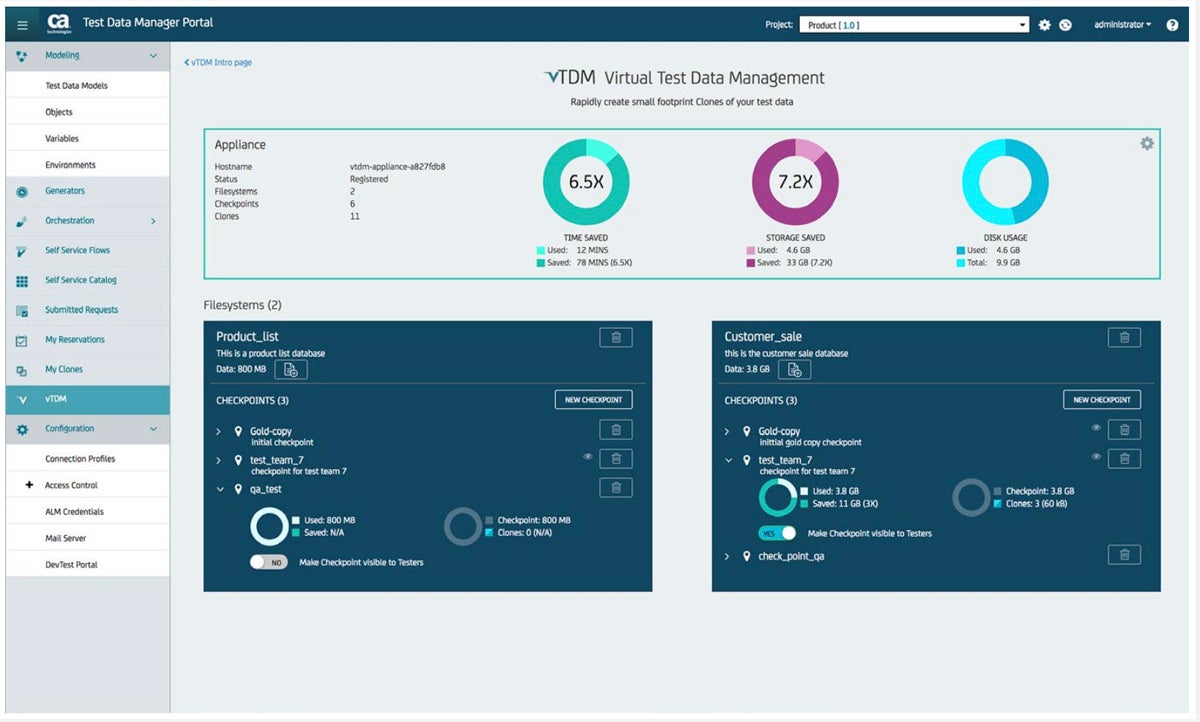
Pricing
Quote available upon request.
Key features
- It has a discovery and profiling feature that allows you to identify personally identifiable information (PII) across multiple data sources.
- It allows you to create future scenarios and unexpected results to test boundary conditions.
- CA’s virtual test data manager capability enables you to generate multiple copies of test data in seconds through cloning.
Pros
- Self-service test data provisioning.
- Integration with governance and risk management.
- Data masking.
Cons
- Limited support.
- Limited resource and product information.
CA Test Data Manager integrations
- Oracle RAC 11g
- Oracle RAC 12c
- IBM DB2 11 for z/OS
- IBM DB2 UDB 11.1
- CA IDMS 19.0
- MySQL 5.6
How to choose the best synthetic data software for your business
When shopping for the best synthetic data software, your organization’s unique needs for synthetic data should be your topmost priority – are you most concerned with compliance, with speed? You need to identify the types of data you need to generate and determine the pain point such data will solve for your business.
After identifying your data needs, it’s time to conduct extensive research – look for solutions that align with your requirements and provide the necessary functionalities. Our evaluation has lessened the research burden for you; there’s quite likely a choice that fits your needs in the list above. Next up is to evaluate the tool’s data generation techniques, customizable capabilities and scalability. And be sure to take the software for a test drive – make sure it actually works for your needs.
How we evaluated the best synthetic data software
We weighed the best synthetic data tools across five categories –each category has sub-categories that helped us evaluate and compare the AI writing tools.
Cost – 20%
We examined the different pricing plans offered by each synthetic data software. This included evaluating the cost of the tool on a monthly or annual basis. We also check to see if the tools offer value for money.
Features set – 30%
We assessed the core data generation capabilities of each tool and its functionalities, including the maturity of the product’s ability to finetune the output and we also confirmed if the tool is geared for large enterprises.
Ease of use – 25%
We looked for intuitive and user-friendly tools, allowing users to navigate and utilize the tool’s features easily.
Tools – 10%
We evaluated each tool’s output quality and scalability level.
Support – 15%
We assessed the availability and responsiveness of customer support channels, such as email, live chat, or phone support. We also considered the availability of resources and documentation, such as user guides, tutorials, or knowledge bases.
Bottom line: Top synthetic data software
There is no one-size-fits-all when selecting the best synthetic data software. For instance, data analysts and machine learning engineers may find Datomize beneficial, while Hazy may be the best option for financial service companies.
The best synthetic data software for you will depend on various factors, including your organization’s specific needs, the use case, the industry, and data compliance requirements. Clearly, given the complexity of this category, you’ll need to do your homework to select the best synthetic data software.
Read next: Generative AI Examples
